Boxer Dog Care Overview
Boxer dogs are a delightful breed known for their playful spirit and affectionate nature. They originated in Germany during the 19th century, initially bred for hunting and as guard dogs. Their medium size, typically weighing between 65-80 pounds and standing 21-25 inches tall, makes them perfect family companions.
The importance of proper care for Boxers cannot be overstated. Ensuring your Boxer receives the right care helps to:
- Promote overall health: Regular veterinary check-ups can catch potential health issues early.
- Support emotional well-being: Boxers thrive on human interaction and require mental stimulation to prevent anxiety.
- Maintain a healthy weight: This breed is prone to obesity, making weight management crucial.
Investing time in learning about Boxer dog care tips will enhance your pup’s quality of life. From tailored exercise routines to nutritional needs, understanding these elements ensures your Boxer remains a happy, energetic member of your family. With the right care approach, you can enjoy many joyful years with your beloved Boxer by your side!
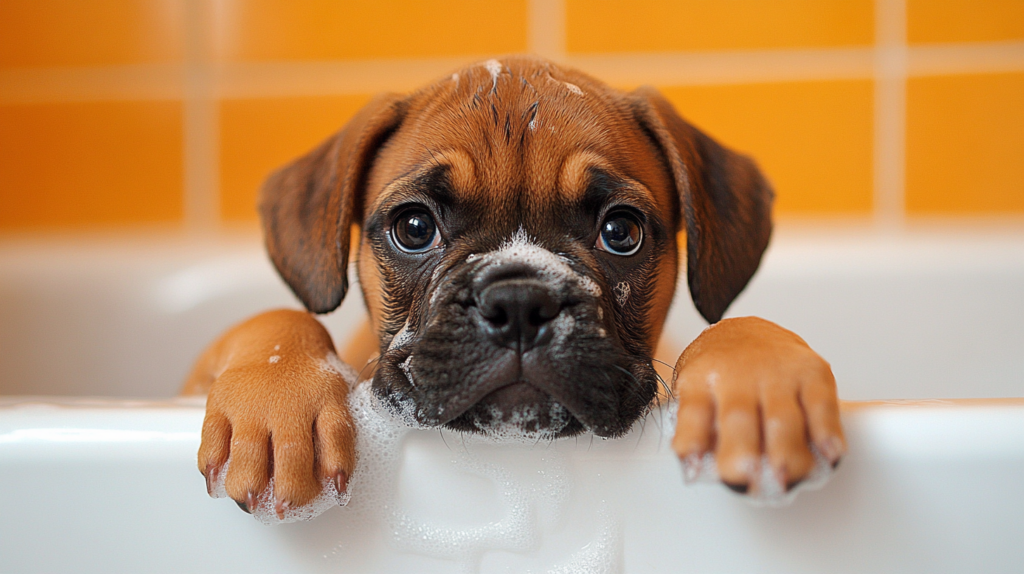
Understanding the Unique Traits and Health Considerations of Boxer Dogs
Boxers are more than just a pretty face! Their personality traits make them truly special companions. Known for their playful, affectionate, and energetic nature, Boxers thrive on human interaction. They bond closely with their families, often acting as protective guardians while being gentle with children. This mix of loyalty and exuberance is part of what makes the Boxer breed so beloved.
However, potential owners should be aware of common health issues that can affect Boxers. Some prevalent conditions include:
- Dilated Cardiomyopathy (DCM): A heart condition that leads to an enlarged heart and reduced ability to pump blood. Symptoms may include lethargy, coughing, and fainting.
- Arrhythmogenic Right Ventricular Cardiomyopathy (ARVC): Another heart condition primarily affecting young adult Boxers. Watch for irregular heartbeats or sudden fainting spells.
- Gastric Dilatation-Volvulus (GDV): Also known as bloat, this life-threatening condition occurs when the stomach fills with gas and twists. Signs include a swollen abdomen, excessive drooling, and restlessness.
Early detection of these health concerns is essential for effective management. Regular veterinary check-ups will help ensure your pup stays healthy and happy.
When it comes to a Boxer’s lifespan, you can generally expect them to live between 10 to 12 years. Factors impacting longevity include genetics, diet, exercise, and healthcare practices. Maintaining a healthy weight through proper nutrition and regular exercise is crucial in mitigating obesity-related health issues that could shorten their lifespan.
Taking the time to understand these unique traits alongside potential health challenges will not only enhance your bond with your Boxer but also provide them with a thriving life full of love and adventure!
Meeting the Exercise Needs of Your Energetic Boxer
Boxers are bundles of energy, and their exercise needs are crucial for a happy and healthy life. Regular physical activity not only keeps them fit but also helps prevent behavioral issues stemming from boredom or excess energy. A Boxer lacking enough exercise may become destructive or overly rambunctious.
Recommended Exercise Duration
When planning a daily exercise routine, consider your Boxer’s age and energy level. Here’s a quick breakdown:
- Puppies (up to 1 year): 30 minutes to 1 hour of playtime daily.
- Adults (1-7 years): 1 to 2 hours, depending on their energy levels.
- Seniors (7+ years): 30 minutes to an hour, focusing on gentle exercises.
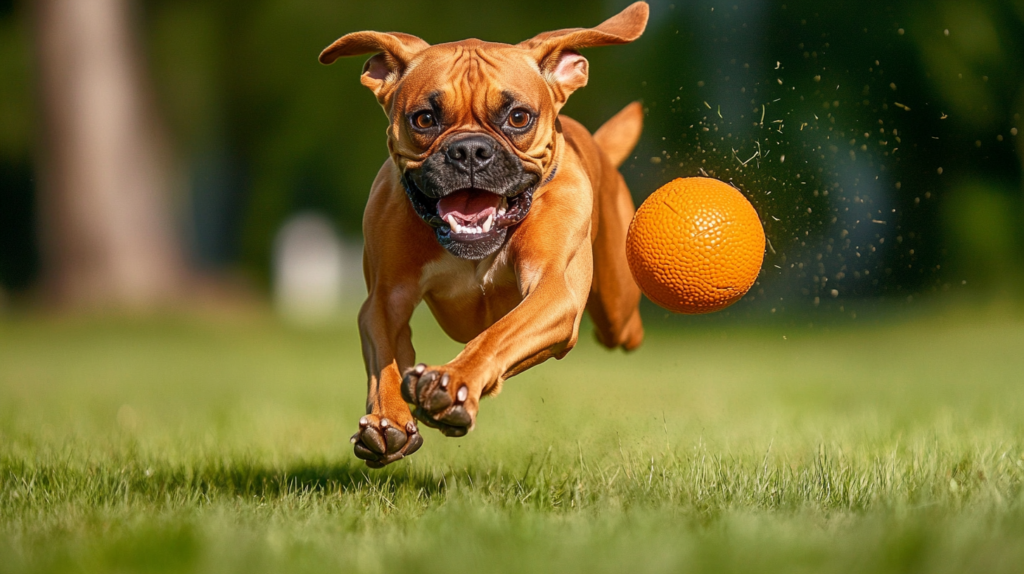
Best Activities for Your Boxer
Engaging your Boxer in a variety of activities ensures they receive both physical and mental stimulation. Here are some fun ideas:
- Agility Training: Set up a mini agility course in your backyard or visit a local agility club. This not only helps burn off energy but also strengthens the bond between you and your pup.
- Fetch: A classic game that never gets old! Use balls or frisbees, and watch your Boxer sprint with glee.
- Tug-of-War: A fantastic way to engage in play while building strength. Just be sure to let them win occasionally; it boosts their confidence!
- Nose Work Games: Hide treats around the house or yard and let your Boxer sniff them out. This taps into their natural instincts and provides mental stimulation.
Boxer Nutrition Needs
Remember, with increased exercise comes the need for proper nutrition to support their active lifestyle. Make sure you feed high-quality dog food that meets their specific dietary requirements. Adjusting feeding times based on exercise will help maintain optimal weight and energy levels.
Regularly mixing up activities keeps your Boxer excited about exercise, ensuring they remain both mentally and physically stimulated. With the right balance of playtime and nutrition, your energetic companion will thrive!
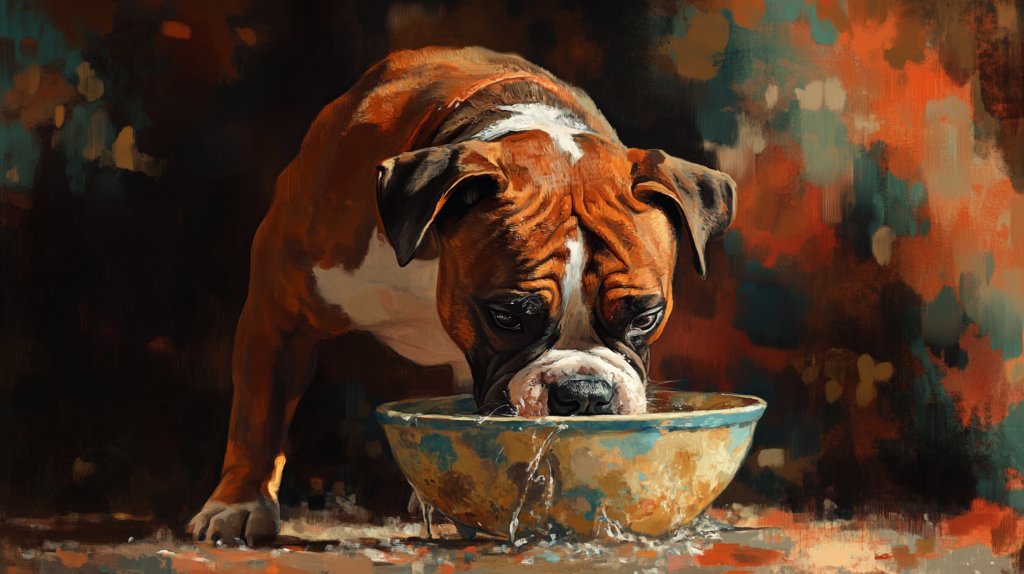
Grooming Your Boxer: Keeping Their Coat Healthy and Shiny
Boxers, with their sleek and short coat, have a grooming routine that is relatively low-maintenance. Their minimal shedding means less time spent cleaning up after them, which is great for busy pet parents!
Boxer Grooming Requirements
- Frequency: Aim for weekly brushing sessions to keep your Boxer’s coat shiny and healthy. This not only removes dead hair but also helps distribute natural oils throughout their fur.
- Tools: A simple rubber brush or a bristle brush works wonders on their short hair. These tools are gentle on the skin and effective in capturing loose fur.
Additional Grooming Tips for Boxer Dogs
- Bathing: Bathe your Boxer sparingly—about once every couple of months or as needed. Overbathing can strip their coat of essential oils, leading to dryness.
- Skin Checks: During grooming sessions, keep an eye out for any unusual bumps, skin irritations, or parasites. Early detection can prevent bigger health issues down the line.
- Nail Trimming: Regular nail trimming is essential to keep those paws healthy! Aim for every 3-4 weeks to prevent overgrowth and discomfort.
Maintaining your Boxer’s coat doesn’t just contribute to their appearance; it plays a crucial role in their overall health and happiness. With proper Boxer coat care, you strengthen the bond between you and your playful pup while ensuring they look their best! For more detailed guidance on how to groom your dog at home, you might find these resources helpful: How to groom your dog at home or Understanding the costs involved in dog grooming.

Shedding Management
Boxer dogs, with their short and sleek coats, do shed, albeit moderately. Managing this shedding is an essential part of care that helps keep your home tidy and your furry friend comfortable. Here’s how to tackle shedding effectively:
Grooming Techniques
- Weekly Brushing: Regular brushing not only helps manage shedding but also stimulates the skin and promotes a healthy coat. Use a rubber curry brush or a slicker brush to remove loose hair effectively.
- Bathing: Bathe your Boxer every couple of months using dog-specific shampoos. This keeps the skin clean and reduces allergens that might contribute to shedding. Be cautious not to over-bathe; it can strip natural oils and lead to dryness.
- Hydration Matters: Ensure your Boxer drinks plenty of water. Proper hydration supports skin health, which in turn can help reduce excessive shedding.
Nutrition Plays a Role
A well-balanced diet significantly impacts the quality of your dog’s coat and skin health.
- High-quality Dog Food: Choose food approved by AAFCO that contains high-quality proteins, omega fatty acids, vitamins, and minerals. These nutrients are vital for maintaining skin elasticity and promoting a shiny coat.
- Supplements: Incorporating omega-3 fatty acid supplements can enhance coat health further. Always consult with your veterinarian before adding any new supplements to ensure they align with your Boxer’s dietary needs.
Regular Health Check-ups
Monitoring your Boxer’s health is crucial in managing shedding effectively.
- Veterinary Visits: Regular check-ups help identify any underlying conditions that may cause excessive shedding, such as allergies or skin infections.
- Dental Care: Maintaining dental hygiene is equally important for overall health, including coat condition. Poor dental health can lead to systemic issues affecting skin and coat quality.
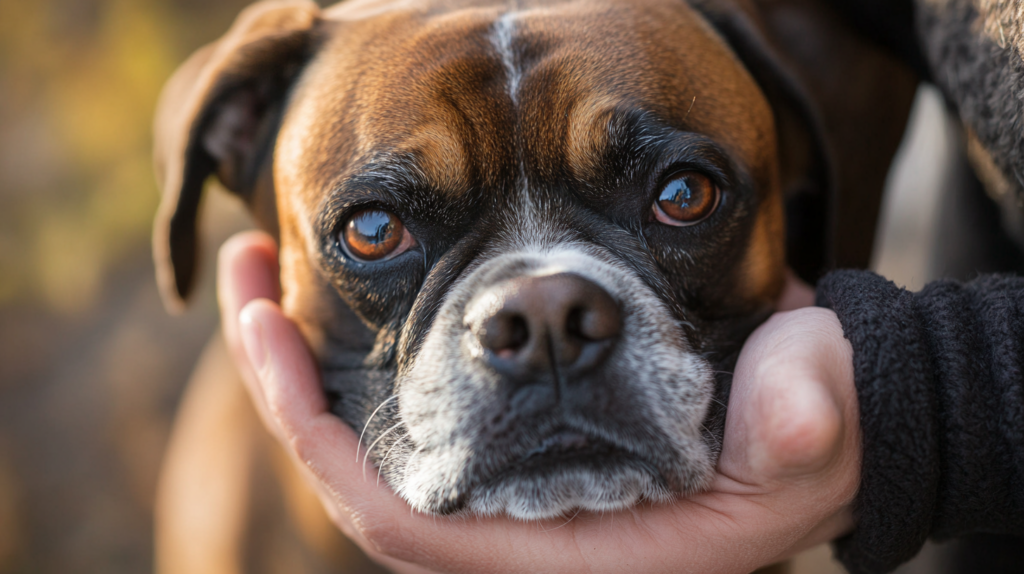
Environmental Factors
Seasonal changes can influence shedding patterns for Boxers.
- Climate Considerations: During warmer months, you might notice increased shedding as Boxers naturally shed their winter coats. In colder seasons, they may have less shedding as their fur thickens for warmth.
- Humidity Levels: In dry environments, skin can become flaky leading to more hair loss. Using humidifiers at home can help maintain moisture in the air, benefiting both your Boxer’s skin and overall comfort.
Incorporating these tips into your routine will make shedding management simpler while keeping your Boxer looking their best!
Feeding Your Boxer Right: A Guide to Their Nutritional Needs and Diet Plan
Feeding your Boxer the best diet is key to their health and happiness. A nutritious, high-quality dog food that is approved by the Association of American Feed Control Officials (AAFCO) ensures that your pup receives all necessary nutrients, supporting their overall well-being.
Feeding Guidelines for Boxers
- Choose High-Quality Dog Food
- Look for options that list meat as the first ingredient. Avoid fillers like corn and soy, which offer little nutritional value.
- Feeding Schedule Recommendations
- Adult Boxers thrive on a feeding schedule of twice daily. This approach helps maintain energy levels throughout the day. Puppies may require more frequent meals, typically three to four times a day, to fuel their rapid growth.
- Portion Control
- Adjust portions based on age, weight, and activity level. An active Boxer may need more calories than a less active one. Regularly monitor your dog’s weight and consult with your vet for tailored advice on portion sizes.
- Hydration Matters
- Fresh water should always be accessible; proper hydration is essential for digestion and overall health.
Following these guidelines will create a solid foundation for a healthy Boxer dog diet, helping them thrive in every aspect of life. The right nutrition combined with love and care contributes significantly to their longevity and quality of life.

Weight Management Tips
Keeping your Boxer fit and healthy is essential to prevent obesity and its related health issues. Here are some practical tips for effective weight management:
1. Monitor Food Intake
- Measure food portions according to the feeding guidelines on dog food packaging.
- Avoid free feeding; set specific meal times.
2. Choose the Right Food
- Select high-quality dog food approved by AAFCO.
- Look for protein-rich options with balanced nutrients tailored for active breeds.
3. Limit Treats
- Use treats sparingly and opt for healthy options like fruits or vegetables.
- Implement a “treat-free day” once a week to reduce calorie intake.
4. Regular Exercise Routine
Incorporate daily activities that stimulate both mind and body, such as:
- Agility training
- Fetch games
- Long walks or runs
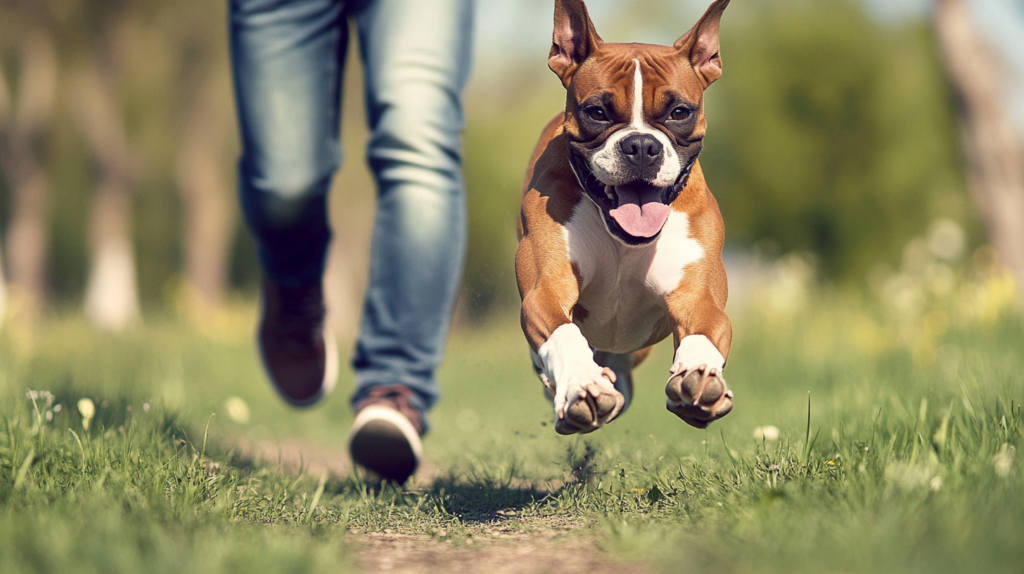
5. Weight Checks
Regularly weigh your Boxer at home or during vet visits.
Adjust diet and exercise based on weight changes observed.
6. Be Mindful of Age and Health Conditions
Consider age when planning exercise; older Boxers may require lower intensity.
Consult with your vet if any health concerns arise impacting weight management.
For more information on managing your dog’s weight effectively, you might find this 4-H manual helpful.
Keeping your furry friend at a healthy weight contributes significantly to their overall happiness and longevity!
Creating a Happy Environment for Your Beloved Boxer Dog
Creating a joyful space for your Boxer goes beyond the basics. Here are some essential elements to consider in your Boxer Dog Care routine:
- Love and Attention: Boxers thrive on affection. Daily cuddles and quality time strengthen your bond.
- Exercise: Engage them in activities that get their tail wagging. Regular walks, playful fetch sessions, or agility training keep their spirits high.
- Mental Stimulation: Challenge their clever minds with puzzle toys or obedience training. This keeps boredom at bay and promotes good behavior.
- Proper Nutrition: High-quality dog food is crucial. Keep an eye on portion sizes to ensure they stay fit and healthy.
- Healthcare: Routine vet visits help catch potential health issues early. Stay up-to-date with vaccinations and preventative care.
- Grooming: Regular brushing not only keeps their coat shiny but also provides an opportunity for bonding.
- Socialization Opportunities: Introduce them to new experiences, people, and pets to cultivate a well-rounded personality.
A well-rounded approach ensures your Boxer feels loved, secure, and happy every day!
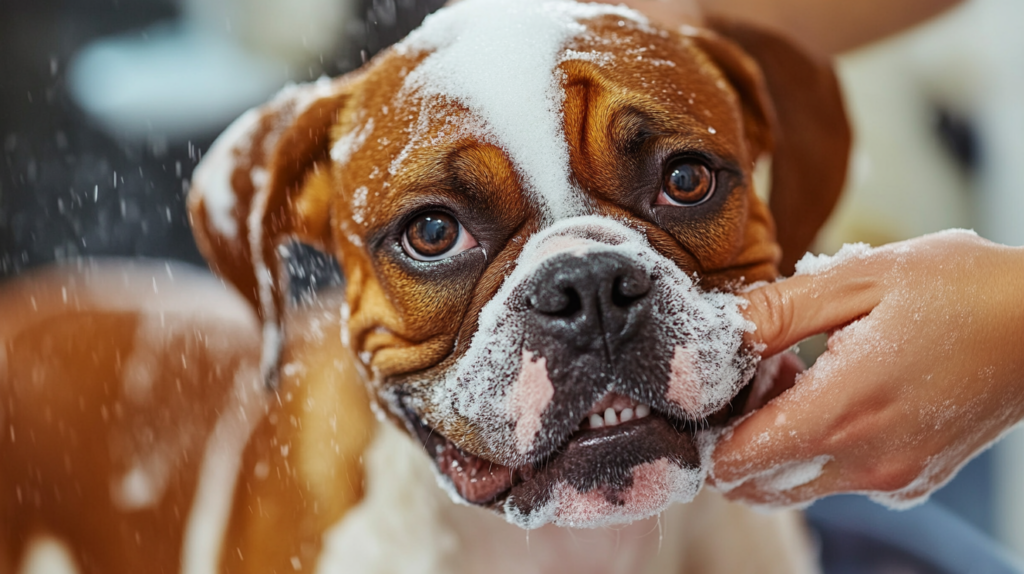
FAQs (Frequently Asked Questions)
What are the unique traits of Boxer dogs?
Boxer dogs are known for their playful and energetic personality, loyalty, and protective nature. They are highly intelligent and require mental stimulation, making them excellent companions for active families.
What are common health issues in Boxers?
Common health concerns in Boxers include dilated cardiomyopathy (DCM), arrhythmogenic right ventricular cardiomyopathy (ARVC), and gastric dilatation-volvulus (GDV). Regular veterinary check-ups can help spot these issues early on.
How much exercise does a Boxer need daily?
Boxers require between 30 minutes to 2 hours of exercise each day, depending on their age and energy level. Activities like agility training and fetch are great for keeping them physically and mentally stimulated.
What grooming needs do Boxer dogs have?
Boxers have a short coat that requires minimal grooming. Weekly brushing is recommended to maintain a healthy coat and skin, as they shed minimally compared to other breeds.
What should I feed my Boxer dog?
A high-quality dog food approved by AAFCO is essential for your Boxer’s overall health. Adult Boxers should be fed twice daily, with portions adjusted based on their age, weight, and activity level.
How can I create a happy environment for my Boxer?
To provide a happy environment for your Boxer, ensure they receive plenty of love, attention, regular exercise, mental stimulation, proper nutrition, healthcare, grooming, training, and socialization opportunities.






